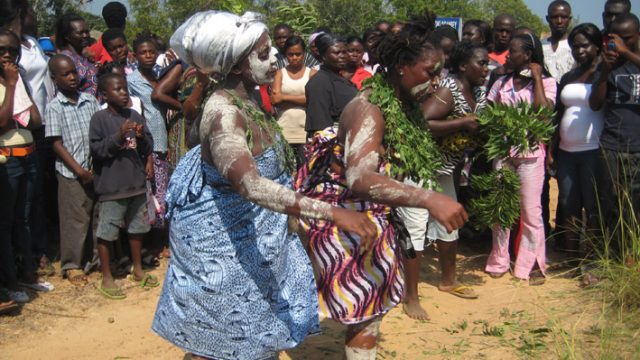Ghanaian cultural festivals are meant specifically to reinforce traditions and ties to communities and land. If you happen to be in Ghana you might just stumble upon one of these six; all are welcome, of course, and if you can walk, then you should certainly dance.
Bugum Festival
A very prominent Muslim holiday in Ghana, Bugum falls in January and reveres the flight of Naiyul-Lah Mohammed from Mecca to Medina in 658 AD. In cities like Dagbani, torches are lit and a procession ensues to a particular location, where dancing and fireworks take place all through the night until the sun comes up. Some say these rituals have Biblical echoes, and symbolize the light Noah used to guide the ark through the dark — hence the nickname “Fire Festival.”
Kundum
This is a traditional harvest festival, falling anywhere between July and November, depending on the village. It is a time when the Ahanta and Nzema people of Western Ghana thanks and praise the gods for their bounty. The festival lasts a week and includes not only celebration, but quiet meditation, loud shouting, boastful singing, dancing, and rhythmic drumming. Legend has it that the festival dates back to at least the 16th century, when a mythical hunter named Akpoley witnessed a dance performed by a group of dwarves, then introduced it to his own people. The dance is supposed to ward off evil from the village.
Homowo Festival
Homowo, which translates roughly to “hunger hoot,” is a celebration centered around the remembrance of a great famine which once affected the Kwa people. At the beginning of the festival, crops are planted in May before the rainy season, it is followed by a banning of drumming and noise in order to allow the farmers to concentrate on their growing. The festival culminates in August, with the official “hoot to hunger,” mocking its devious ways by giant amounts of feasting, especially with kpokpoi, a meal of palm nut soup and maize sprinkled around on the ground during the festivities. In the bustling capital city of Accra, the Ga group of the greater Kwa people of the region have propelled this incredibly important and popular festival into the urban mainstream.
Adae Kese Festival
The Ashanti of the Asante kingdom. Also named “The Big Adae,” the festival is an homage to the self, to the community, to the independence of the great kingdom, and to the elders and chiefs. The festival repeats itself every six weeks on a Sunday (by the cycle of the Akan calendar)–sometimes to a quiet, contemplative degree, sometimes to a boisterous and noisy fanfare. Usually done in two phases spanning nearly nine months; the first phase is private and includes members of the royal family meeting in sacred chambers, and second phase is public and meant for everybody to participate.
Panafest
Panafest is a special event that needs to be judiciously sought after, as it takes place only every two years. Ghana’s Cape Coast is merely the host of this means to promote Pan-Africanism through a multitude of different countries. Panafest aims to educate Africans to “reconnect their strengths and rededicate themselves to fully assume their own destiny in recognition of the lessons of history.” Through heartfelt song and dance, a zealous amount of costumes, and educational lecture series, Ghana hosts this clamoring of life near it’s own sorrowful sites where the Transatlantic slave trade was prominent. All of the celebrations converge on Emancipation Day, the first Monday in August.
Hogbetsotso
Another seasonal peculiarity of a certain tribe, the Hogbetsotso festvail lauds and honors the leaders of the Anlow Ewe people of Ghana’s East Coast. The Anslow Ewe arrived long ago via a mass migration from South Sudan to Togo. The honorary leaders once led the people (in a backwards walk, apparently) to their promised land away from the evil Notsi ruler Ago-Koli. Unsurprisingly, it goes with the motif of Ghanaian celebrations thus far: go nuts and have fun! Besides dancing, singing, and feasting, there’s the unusual purification of the stool ceremony, and a peace-making observance promoted among grudge-holding people in the tribe. Everything in the festival follows the theme of cleansing, and the village and surrounding areas are literally swept clear of trash during this celebrated first week of November.
More from AFKTravel:
The Best Places For Bird Watching In West Africa
7 Great Walks, Treks And Hikes In West Africa
This article was originally published April 16, 2015.

